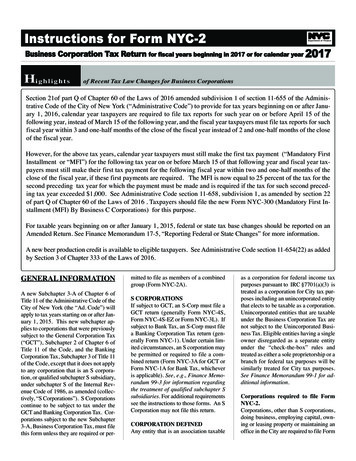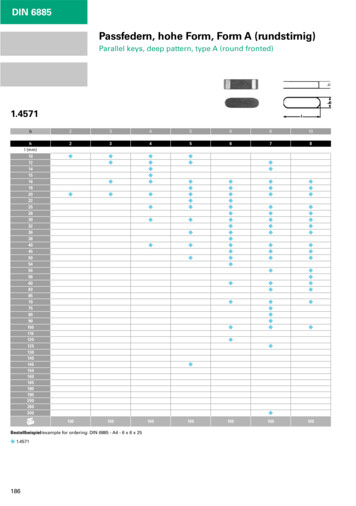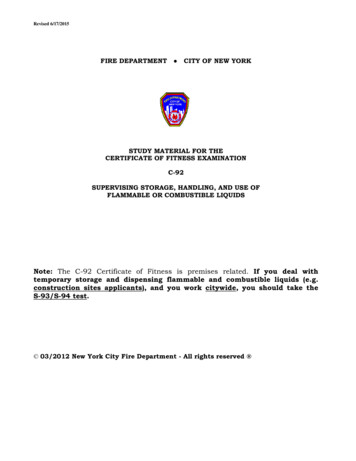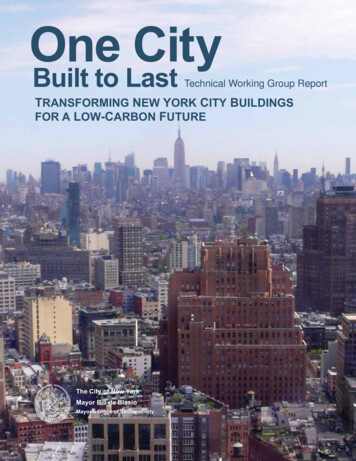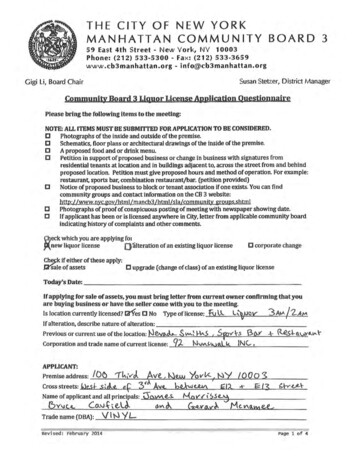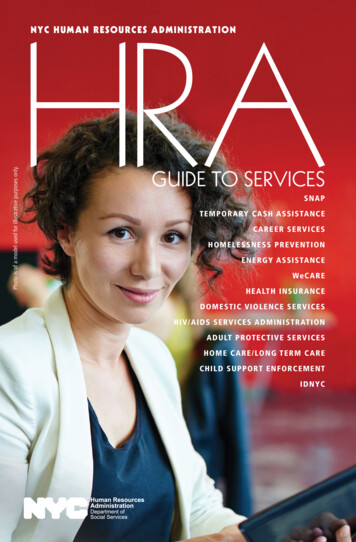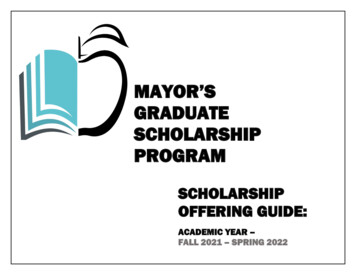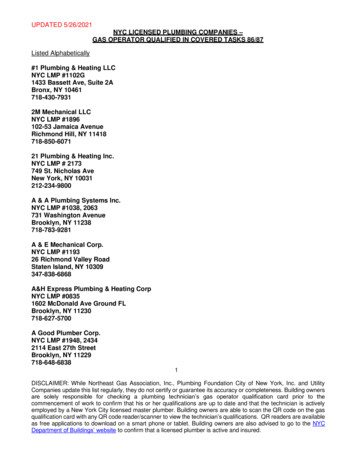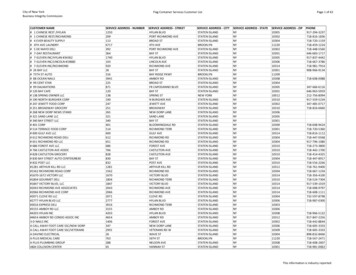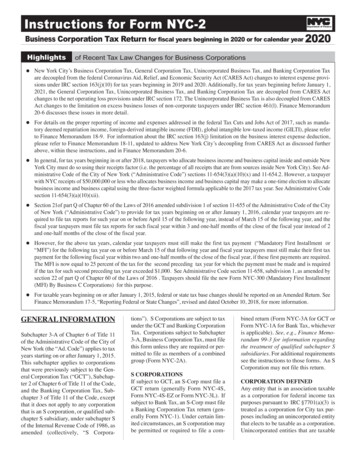
Transcription
Instructions for Form NYC-2Business Corporation Tax Return for fiscal years beginning in 2020 or for calendar year 2020Highlightsof Recent Tax Law Changes for Business CorporationslNew York City’s Business Corporation Tax, General Corporation Tax, Unincorporated Business Tax, and Banking Corporation Taxare decoupled from the federal Coronavirus Aid, Relief, and Economic Security Act (CARES Act) changes to interest expense provisions under IRC section 163(j)(10) for tax years beginning in 2019 and 2020. Additionally, for tax years beginning before January 1,2021, the General Corporation Tax, Unincorporated Business Tax, and Banking Corporation Tax are decoupled from CARES Actchanges to the net operating loss provisions under IRC section 172. The Unincorporated Business Tax is also decoupled from CARESAct changes to the limitation on excess business losses of non-corporate taxpayers under IRC section 461(l). Finance Memorandum20-6 discusses these issues in more detail.lFor details on the proper reporting of income and expenses addressed in the federal Tax Cuts and Jobs Act of 2017, such as mandatory deemed repatriation income, foreign-derived intangible income (FDII), global intangible low-taxed income (GILTI), please referto Finance Memorandum 18-9. For information about the IRC section 163(j) limitation on the business interest expense deduction,please refer to Finance Memorandum 18-11, updated to address New York City’s decoupling from CARES Act as discussed furtherabove, within these instructions, and in Finance Memorandum 20-6.lIn general, for tax years beginning in or after 2018, taxpayers who allocate business income and business capital inside and outside NewYork City must do so using their receipts factor (i.e. the percentage of all receipts that are from sources inside New York City). See Administrative Code of the City of New York (“Administrative Code”) sections 11-654(3)(a)(10)(x) and 11-654.2. However, a taxpayerwith NYC receipts of 50,000,000 or less who allocates business income and business capital may make a one-time election to allocatebusiness income and business capital using the three-factor weighted formula applicable to the 2017 tax year. See Administrative Codesection 11-654(3)(a)(10)(xii).lSection 21of part Q of Chapter 60 of the Laws of 2016 amended subdivision 1 of section 11-655 of the Administrative Code of the Cityof New York (“Administrative Code”) to provide for tax years beginning on or after January 1, 2016, calendar year taxpayers are required to file tax reports for such year on or before April 15 of the following year, instead of March 15 of the following year, and thefiscal year taxpayers must file tax reports for such fiscal year within 3 and one-half months of the close of the fiscal year instead of 2and one-half months of the close of the fiscal year.lHowever, for the above tax years, calendar year taxpayers must still make the first tax payment (“Mandatory First Installment or“MFI”) for the following tax year on or before March 15 of that following year and fiscal year taxpayers must still make their first taxpayment for the following fiscal year within two and one-half months of the close of the fiscal year, if these first payments are required.The MFI is now equal to 25 percent of the tax for the second preceding tax year for which the payment must be made and is requiredif the tax for such second preceding tax year exceeded 1,000. See Administrative Code section 11-658, subdivision 1, as amended bysection 22 of part Q of Chapter 60 of the Laws of 2016 . Taxpayers should file the new Form NYC-300 (Mandatory First Installment(MFI) By Business C Corporations) for this purpose.lFor taxable years beginning on or after January 1, 2015, federal or state tax base changes should be reported on an Amended Return. SeeFinance Memorandum 17-5, “Reporting Federal or State Changes”, revised and dated October 10, 2018, for more information.GENERAL INFORMATIONSubchapter 3-A of Chapter 6 of Title 11of the Administrative Code of the City ofNew York (the “Ad. Code”) applies to taxyears starting on or after January 1, 2015.This subchapter applies to corporationsthat were previously subject to the General Corporation Tax (“GCT”), Subchapter 2 of Chapter 6 of Title 11 of the Code,and the Banking Corporation Tax, Subchapter 3 of Title 11 of the Code, exceptthat it does not apply to any corporationthat is an S corporation, or qualified subchapter S subsidiary, under subchapter Sof the Internal Revenue Code of 1986, asamended (collectively, “S Corpora-tions”). S Corporations are subject to taxunder the GCT and Banking CorporationTax. Corporations subject to Subchapter3-A, Business Corporation Tax, must filethis form unless they are required or permitted to file as members of a combinedgroup (Form NYC-2A).S CORPORATIONSIf subject to GCT, an S-Corp must file aGCT return (generally Form NYC-4S,Form NYC-4S-EZ or Form NYC-3L). Ifsubject to Bank Tax, an S-Corp must filea Banking Corporation Tax return (generally Form NYC-1). Under certain limited circumstances, an S corporation maybe permitted or required to file a com-bined return (Form NYC-3A for GCT orForm NYC-1A for Bank Tax, whicheveris applicable). See, e.g., Finance Memorandum 99-3 for information regardingthe treatment of qualified subchapter Ssubsidiaries. For additional requirementssee the instructions to those forms. An SCorporation may not file this return.CORPORATION DEFINEDAny entity that is an association taxableas a corporation for federal income taxpurposes pursuant to IRC §7701(a)(3) istreated as a corporation for City tax purposes including an unincorporated entitythat elects to be taxable as a corporation.Unincorporated entities that are taxable
Instructions for Form NYC-2 - 2020under the Business Corporation Tax arenot subject to the Unincorporated Business Tax. Eligible entities having a singleowner disregarded as a separate entityunder the “check-the-box” rules andtreated as either a sole proprietorship or abranch for federal tax purposes will besimilarly treated for City tax purposes.See Finance Memorandum 99-1 for additional information.Corporations required to file FormNYC-2.Corporations, other than S corporations,doing business, employing capital, owning or leasing property or maintaining anoffice in the City are required to file FormNYC-2. Pursuant to section 21 of Chapter 201 of the Laws of 2009, for tax yearsbeginning on or after January 1, 2011, theBanking Corporation Tax was amendedto provide criteria by which banking corporations, engaged in the business ofcredit card transactions and not otherwisedoing business in New York City, wouldbe subject to tax if they met certain criteria, regarding credit card customers ormerchant customer contracts in the City.Some of these criteria were carried overand incorporated into the Business Corporation Tax. Pursuant to these criteria, acorporation is doing business in the cityif (1) it has issued credit cards (bank,credit travel and entertainment) to onethousand or more customers who have amailing address in the city as of the lastday of its taxable year and (2) it has merchant customer contracts with merchantsand the total number of locations coveredby those contracts equals one thousand ormore locations in the city to whom thecorporation remitted payment for creditcard transactions during the taxable year,or (3) the sum of the number of customersdescribed in (1) plus the number of locations covered by its contracts describe in(2) equal one thousand or more.Corporate Partners If a partnership is doing business, employing capital, owning or leasingproperty, or maintaining an office, orderiving receipts from activity, inNew York City, then a corporationthat is a general partner in that partnership is subject to tax and must fileForm NYC-2.Page 2 If a partnership is doing business, employing capital, owning or leasingproperty or maintaining an office inNew York City, then a corporationthat is a limited partner of that partnership may be subject to tax pursuant to the regulations promulgatedby the Commissioner of Finance. See19 RCNY §11-06.ness Corporation Tax on their distributive share of the income of any suchentity.d) A limited profit housing corporationorganized and operating pursuant tothe provisions of Article Two of thePrivate Housing Finance Lawe) Insurance corporationsThe following are NOT required to filea Business Corporation Tax Return(Form NYC-2):a) A dormant corporation that did not atany time during its taxable year engage in any activity or hold title to realproperty located in New York Cityb) A nonstock corporation, organizedand operated exclusively for nonprofitpurposes and not engaged in substantial commercial activities, that hasbeen granted an exemption by the Department of Financec) Corporations subject to taxation underChapter 11, Title 11 (Utility Corporations) of the NYC AdministrativeCode are not required to file BusinessCorporation Tax returns. However,corporations that are subject to taxunder Chapter 11 as vendors of utilityservices are subject to the BusinessCorporation Tax in accordance withsection 11-653.4 of the Code andmust file a return.WIRELESS TELECOMMUNICATIONS SERVICE PROVIDERS. Entities who receive eighty percent ormore of their gross receipts fromcharges for the provision of mobiletelecommunications services to customers will be taxed as if they wereregulated utilities for purposes of theNew York City Utility Tax, GeneralCorporation Tax and Business Corporation Tax. Thus, such entities will besubject to only the New York CityUtility Tax. The amount of gross income subject to tax has been redefined to conform to the FederalMobile Telecommunications Sourcing Act of 2000. In addition, partnersin any such entity will not be subjectto General Corporation Tax or Busi-f) A Housing Development Fund Company (HDFC) organized and operating pursuant to the provisions ofArticle 11 of the Private Housing Finance Lawg) Organizations organized exclusivelyfor the purpose of holding title toproperty as described in Sections501(c)(2) or (25) of the Internal Revenue Codeh) An entity treated as a Real EstateMortgage Investment Conduit(REMIC) for federal income tax purposes. (Holders of interests in aREMIC remain taxable on such interests or on the income thereon.)i) Corporations principally engaged inthe conduct of a ferry business andoperating between any of the boroughs of the City under a leasegranted by the Cityj) A corporation principally engaged inthe conduct of an aviation, steamboat,ferry or navigation business, or twoor more such businesses, providedthat all of the capital stock of the corporation is owned by a municipal corporation of New Yorkk) Corporations principally engaged inthe operation of marine vessels whoseactivities in the City are limited exclusively to the use of property in interstate or foreign commercel) Foreign corporations that are exemptunder the provisions of Public Law86- 272. See 19 RCNY Section 11-04(b)(11).m) Alien Corporations—An alien corporation (a corporation organized under
Instructions for Form NYC-2 - 2020the laws of a country, or any politicalsubdivision thereof, other than theUnited States, or organized under thelaws of a possession, territory orcommonwealth of the United States)is not deemed to be doing business,employing capital, owning or leasingproperty, maintaining an office, or deriving receipts from activity, in thecity if the activities in the city are limited to: investing or trading in stocks andsecurities for its own accountwithin the meaning of IRC§864(b)(2)(A)(ii);investing or trading in commoditiesfor its own account within the meaning of IRC §864(b)(2)(B)(ii); orany combination of these activities. See Ad. Code §11-653(2-a).An alien corporation that under anyprovision of the IRC is not treated asa domestic corporation as definedunder IRC section 7701 and has noeffectively connected income for thetax year is not subject to tax pursuantto clause three of the opening paragraph of Ad. Code §11-652(8).n) An entity that would otherwise meetthe definition of a corporation butthat was subject to the Unincorporated Business Tax (“UBT”) for itstaxable year beginning in 1995 andthat made an election not to be characterized as a corporation under theGeneral Corporation Tax, will alsonot be a corporation under the Business Corporation Tax (Subchapter 3A) unless and until it revokes itselection.NOTE: A corporation that has an officer, employee, agent or representative inthe City and that is not subject to theBusiness Corporation Tax is not requiredto file a Form NYC-2 but must file aForm NYC-245 (Section 11-655 of theNYC Administrative Code).A corporation shall not be deemed to bedoing business, employing capital, owning or leasing property, or maintaining anPage 3office, in the city by reason of: The maintenance of cash balanceswith banks or trust companies in thecity; The ownership of shares of stock orsecurities kept in the city if kept in asafe deposit box, safe, vault, or otherreceptacle rented for the purpose, ofif pledged as collateral security, or ifdeposited with one or more banks ortrust companies, or with brokers whoare members of a recognized securityexchange, in safekeeping or custodyaccounts; The taking of any action by any suchbank or trust company or broker,which is incidental to the rendering ofsafekeeping or custodian service tothe corporation; The maintenance of an office in thiscity by one or more officers or directors of the corporation who are notemployees of the corporation if thecorporation otherwise is not doingbusiness in the city, and does not employ capital or own or lease propertyin the city; The keeping of books or records of acorporation in the city if such booksand records are not kept by employees of the corporation and the corporation does not otherwise do business,employ capital, own or lease property, or maintain an office in the city;or Any combination of the activitieslisted above.WHEN AND WHERE TO FILEThe due date for filing is on or before April15, 2021 or, for fiscal year taxpayers, on orbefore the 15th day of the 4th month following the close of the fiscal year.Special short-period returns: If this isNOT a final return and your federal return covered a period of less than 12months as a result of your joining or leaving a federal consolidated group or as aresult of a federal IRC §338 election, thisreturn generally will be due on the duedate for the federal return and not on thedate noted above.Mail all returns, except refund returns:NYC Department of FinanceP.O. Box 5564Binghamton, NY 13902-5564Remittances – Pay online with FormNYC- 200V at nyc.gov/eservices, orMail payment and Form NYC-200V only to:NYC Department of FinanceP.O. Box 3933New York, NY 10008-3933Mail returns claiming refunds:NYC Department of FinanceP.O. Box 5563Binghamton, NY 13902-5563AUTOMATIC EXTENSIONSAn automatic extension of six months forfiling this return will be allowed if, by theoriginal due date, the taxpayer files with theDepartment of Finance an application forautomatic extension on Form NYC-EXTand pays the amount properly estimated asits tax. See the instructions for Form NYCEXT for information regarding what constitutes a proper estimated tax for thispurpose. Failure to pay a proper estimatedamount will result in a denial of the extension. A taxpayer with a valid six-month automatic extension filed on Form NYC-EXTmay request up to two additional threemonth extensions by filing Form NYCEXT.1. A separate Form NYC-EXT.1 mustbe filed for each additional three-month extension. Forms NYC-EXT and EXT.1 maybe submitted electronically via the Department’s Website or mailed to the address indicated on those forms.FINAL RETURNSIf a corporation ceases to do business inNew York City, the due date for filing afinal Business Corporation Tax Return isthe 15th day after the date of the cessation (Ad. Code Section 11- 655). Corporations may apply for an automaticsix-month extension for filing a final return by filing Form NYC-EXT, Application for Automatic 6- Month Extensionof Time to File Business Income Tax Re-
Instructions for Form NYC-2 - 2020turn on or before that date. Any tax duemust be paid with the final return or theextension, whichever is filed earlier.AMENDED RETURNSIf you are filing an amended return forany purpose, mark an X in the Amendedreturn box on page 1 of the return.If you file an amended federal or state return, you must file an amended New YorkCity return within 90 days (or 120 daysif filing an amended combined returnthereafter).You must file using the correct year’s return for the tax year being amended. Donot use the most current year’s return ifthe current year is not the year beingamended. If you file on the wrong year’sreturn, it may cause the amended returnto be rejected, or may cause a delay in receiving any tax benefits being claimed.The Business Corporation Tax is effective January 1, 2015 and does not applyto any tax return filed for a tax year commencing prior to January 1, 2015.FOR AMENDED RETURNS BASEDON CHANGES TO FEDERAL ORSTATE TAXABLE INCOME OROTHER TAX BASEFor taxable years beginning on or afterJanuary 1, 2015, changes in taxable income or other tax base made by the Internal Revenue Service (“IRS”) and /or NewYork State Department of Taxation andFinance (“DTF”) will no longer be reported on Form NYC-3360 or FormNYC-3360B. Instead, taxpayers must report these federal or state changes to taxable income or other tax base by filing anamended return. This amended returnmust include a tax worksheet that identifies each change to the tax base (“TaxBase Change”) and shows how each suchTax Base Change affects the taxpayer’scalculation of its New York City tax. Atemplate for the tax worksheet is availableon the DOF website at nyc.gov/finance.This amended return must also include acopy of the IRS and/or DTF final determination, waiver, or notice of carrybackallowance. Taxpayers that have federaland state Tax Base Changes for the sametax period may report these changes onPage 4the same amended return that includesseparate tax worksheets for the IRS TaxBase Changes and the DTF Tax BaseChanges. Note that for taxable years beginning on or after January 1, 2015, DTFTax Base Changes may include changesthat affect income or capital allocation.The Amended Return checkbox on thereturn is to be used for reporting an IRSor DTF Tax Base Changes, with the appropriate box for the agency making theTax Base Changes also checked. Taxpayers must file an amended return forTax Base Changes within 90 days (120days for taxpayers filing a combined report) after (i) a final determination on thepart of the IRS or DTF, (ii) the signing ofa waiver under IRC §6312(d) or NY TaxLaw §1081(f), or (iii) the IRS has allowed a tentative adjustment based on aan NOL carryback or a net capital losscarryback.If the taxpayer believes that any Tax BaseChange is erroneous or should not applyto its City tax calculation, it should not incorporate that Tax Base Change into itsCity tax calculation on its amended return.However, the taxpayer must attach: (i) astatement to its report that explains why itbelieves the adjustment is erroneous or inapplicable; (ii) the explanatory tax worksheet that identifies each Tax Base Changeand shows how each would affect its Citytax calculation; and (iii) a copy of the IRSand/or DTF final determination, waiver, ornotice of carryback allowance.For more information on federal or stateTax Base Changes, including a more expansive explanation of how taxpayersmust report these changes as well as sample tax worksheets to be included withinthe amended return, see Finance Memorandum 17-5, “Reporting Federal orState Changes”, revised and dated October 10, 2018.ACCESSING NYC TAX FORMSBy Computer - Download forms from theFinance website at nyc.gov/financeBy Phone - Order forms by calling 311. Ifcalling from outside of the five NYC boroughs, please call 212-NEW-YORK(212- 639-9675).OTHER F
credit card transactions and not otherwise doing business in New York City, would be subject to tax if they met certain crite-ria, regarding credit card customers or merchant customer contracts in the City. Some of these criteria were carried over and incorporated into the
